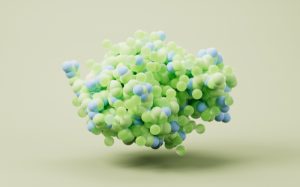
A novel enzyme with increased catalytic efficiency for the biosynthesis of adipic acid from sustainable sources. The enzyme could resolve the current “bottleneck” in industrial bioproduction of adipic acid, a high-value, high-volume chemical used in the manufacturing of nylon-6,6, polyurethane, and plasticisers.
Application
Production of adipic acid from renewable feedstocks
Development Status
Undergoing scale-up
IP Status
Priority patent filed in 2025
Commercial Offering
Technology available for licensing
Opportunity
Adipic acid, a key nylon 6-6 monomer, is currently derived from non-renewable petrochemicals and its production is energy-intensive and generates harmful greenhouse gases. Our novel enzyme enables the bioproduction of adipic acid from sustainable sources (waste plastic and lignin) using a “one pot” reaction by facilitating the generation of adipic acid from cis,cis-muconic acid in aerobic conditions. This step is a critical bottleneck currently preventing the widespread use of industrial adipic acid bioproduction pathways.
The new enzyme increases production efficiency and yields, providing a valuable opportunity to companies wishing to decrease their environmental impact, use sustainable feedstocks and reduce their reliance on fossil fuels.
Technology Overview
One of the major challenges in the enzymatic production of adipic acid from sustainable materials is that oxygen is required by key enzymes. The presence of oxygen, however, negatively impacts the performance of the currently known oxygen-sensitive enoate reductases, which catalyse the final step in the pathway - the reduction of cis,cis-muconic acid to adipic acid. This is a common step in the two pathways for adipic acid production using sustainable feedstocks: the PET plastic waste pathway and the lignin (guaiacol) pathway.
This innovation solves this problem, as the new enzyme is oxygen-tolerant and is therefore compatible with the other enzymes in the pathway. The new enzyme has been shown to enhance the “one pot” enzymatic conversion of terephthalic acid (TPA), sourced from PET plastic waste, into adipic acid via the cis,cis-muconic acid pathway, with increased yields.
Benefits
Quote: TEC1104849

Technology Transfer Manager
School of Biological Sciences
The Roslin Institute
College of Veterinary Medicine